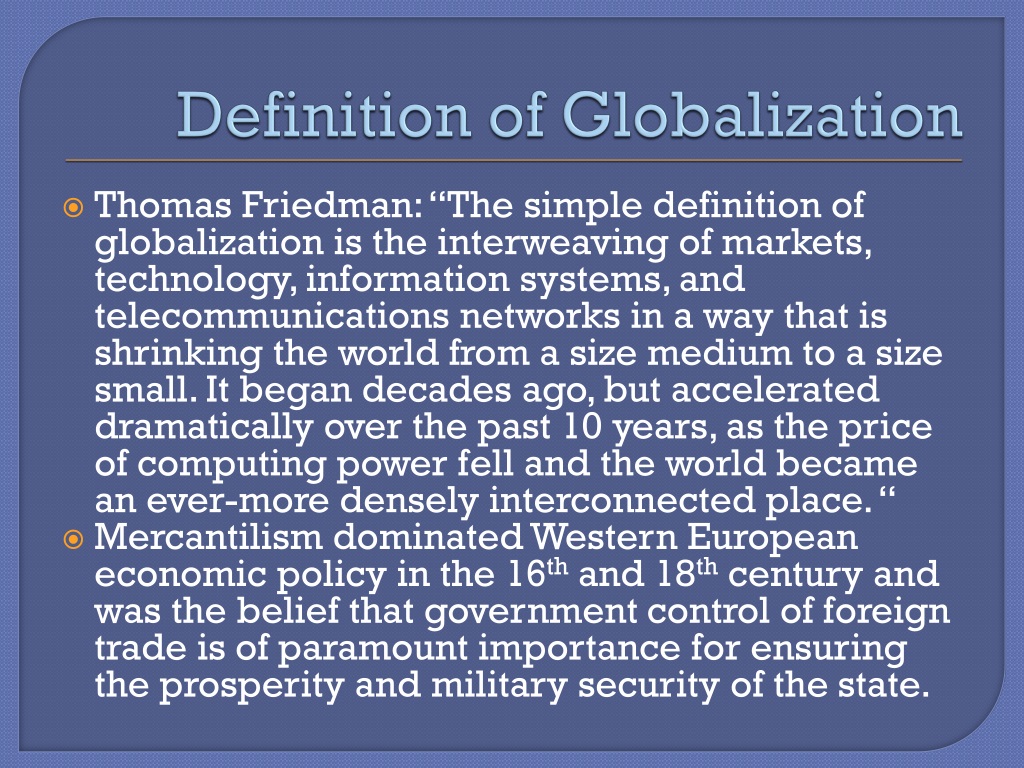What Are The Major Problems And Issues Of Globalisation?
Conversely, opening the economy to trade and long-term capital flows need not make the poor worse off if appropriate domestic policies and institutions are in place–particularly to help shift production to more marketable goods and help workers enter new jobs. Those who are dubious of the benefits of globalization point out that poverty has remained stubbornly high in sub-Saharan Africa. Between 1981 and 2001 the fraction of Africans living below the international poverty line increased from 42 to 47 percent. But this deterioration appears to have less to do with globalization than with unstable or failed political regimes.If anything, such instability reduced their extent of globalization, as it scared off many foreign investors and traders. Volatile politics amplifies longer-term factors such as geographic isolation, disease, overdependence on a small number of export products, and the slow spread of the Green Revolution [see Can Extreme Poverty Be Eliminated?
- Volkswagen Mexico also makes Jettas and, in a special hall, 80 classic Beetles a day to sell in Mexico, one of the last places in the world where the old Bug still chugs.
- When this happens, a name change can be a way of getting customers to shed those old, negative connotations.
- Recycling, conservation of resources, reduction of wastages and such other measures to alleviate environmental abuses require new technologies in the fields of product design, manufacturing and product utilisation.
- The second scenario is one where the global economy adjusts to living with the coronavirus.
- It describes the way countries and people of the world interact and integrate.
Wealthy nations justify pressure on small countries to open markets by arguing that these countries cannot grow rice and corn efficiently — that American crops are cheap food for the world’s hungry. But with subsidies this large, it takes chutzpah to question other nations’ efficiency. And in fact, the poor suffer when America is the supermarket to the world, even at bargain prices. There is plenty of food in the world, and even many countries with severe malnutrition are food exporters. If they are forced off their land by subsidized grain imports, they starve.

Concerns and issues are often raised about the impact of globalization on employment, working conditions, income and social protection. Beyond the world of work, the social dimension encompasses security, culture and identity, inclusion or exclusion and the cohesiveness of families and communities. On the whole, globalization presents a number of challenges to feminist political philosophers who seek to develop conceptions of justice and responsibility capable of responding to the lived realities of both men and women. As globalization will most certainly continue, these challenges are likely to increase in the coming decades. As we have outlined above, feminist political philosophers have already made great strides towards understanding this complex phenomenon.
Developing a robust global supply system for the medico-pharmaceutical industry is another relevant issue. There is, certainly, the risk of cultural imperialism, and the assumption that core nations (and core-nation multinationals) know what is best for those struggling in the world’s poorest communities. Whether well intentioned or not, the vision of a continent of Africans successfully chatting on their iPhone may not be ideal.
Similarly, Uma Narayan criticize feminists for unwittingly adopting a Eurocentric perspective. For example, some Western feminist scholars, such as Mary Daly, strongly criticize cultural practices, such as sati, the Indian practice of widow immolation, as self-evidently wrong. However, Narayan argues that approaching sati as an isolated, local phenomenon fundamentally misrepresents it. Understanding sati in the context of colonial history provides a richer analysis of this practice, since it gained its symbolic power during British rule as an emblem of Hindu and Indian culture . Highlighting the role that colonialism has played in shaping local practices enables feminists to avoid adopting a Eurocentric perspective.
It’s a common perception that trade flows are driven by companies searching for low-cost labor. However, in value chains today, only 18% of the goods trade is based strictly on labor-cost arbitrage. But while it’s tempting to extrapolate the past effects of globalization into the future, such a leap may also be a mistake.
Proponents of globalization claim that economic liberalization has enabled many people throughout the world to move out of conditions of dire poverty. Critics point out that neoliberal policies have created the widest gap between the very rich and very poor in history, with unprecedented wealth for the rich and poverty and destitution for millions of the global poor . Feminists have pointed out that pockets of highly concentrated wealth in the “global South” and the high levels of extreme poverty in the “global North” mean that we cannot divide the world neatly along North/South or rich/poor lines . However, on the whole, they argue, globalization has benefitted the world’s wealthiest people—both citizens of the global North and the elite in developing countries—without substantially benefitting the majority of the world’s population.
The problem is determining to what extent globalisation problems is responsible for widening differentials, and to what extent other economic changes have increased the relative demand for skills. Some of the reason for holding down the real wages of working people in rich countries must be greater imports from lower-wage countries abroad. China is having a population of 1.26 billion people which is equivalent to 20 percent of the world’s total population.
Given this broad conception of intersectionality, feminist theorists of globalization insist that gender injustices arise within specific transnational contexts, such as historical relationships among nations and current global economic policies. However, not all feminist political philosophers agree with this approach. Some believe that new feminist ideals, such as relational understandings of power, collective responsibility, and mutual dependence, are needed to diagnose the gender injustices associated with globalization . For instance, Iris Marion Young argues the traditional ideal theories of justice are unable to account for the unjust background conditions that contribute to the development of sweatshops in the global South. She argues that a new relational model of responsibility, which she calls the social connection model, is needed to articulate the obligations that people in affluent northern countries have to workers in the global South.
Another possible danger, and harmful effect, is the overuse and abuse of natural resources to meet new higher demands in the production of goods. The degree to which an organization is globalized and diversified has bearing on the strategies that it uses to pursue greater development and investment opportunities. Economic theory also predicts that a single firm may become less efficient if it becomes too large. The additional costs of becoming too large are called diseconomies of scale.
